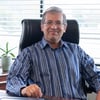Podcast
Health Technology
Thought Leadership
Growth in Focus - Dr Ziad
8 July, 2025
How technology and AI are reshaping healthcare
Welcome to Growth in Focus, where business and industry leaders provide valuable insights into their thinking.
In an exclusive interview led by futurist and economist Bronwyn Williams, Dr Seedat, a clinical oncologist and health IT innovator, outlined how his organisation is leveraging digital systems to reduce costs, improve patient outcomes, and prepare for an AI-driven future.
As South Africa faces infrastructure challenges and healthcare disparities, Dr Ziad Seedat, Managing Director of Hopelands Cancer Centre (the largest private oncology provider in KwaZulu-Natal), proves that technology can bridge gaps —if implemented strategically.
According to Dr Seedat, South African healthcare and healthcare providers face significant challenges, namely:
-
Fragmented and inefficient health information systems Resistance to technology adoption
-
Data privacy concerns
-
High costs and inefficiencies in treatment delivery
-
Challenge in public-private sector collaboration
-
Infrastructure and operational challenges
“Every small additional service we provide makes a huge difference."

Dr Ziad Seedat, Managing Director of Hopelands Cancer Centre

From paper to the cloud
One of the biggest hurdles in modern healthcare is the slow adoption of technology. Like many medical fields, Dr Seedat acknowledges that oncology has resisted change, often relying on outdated paper-based systems.
Existing paper-based systems are often less secure than digital alternatives, but the perceived risks of digital systems hinder adoption.
Hopelands Cancer Centre tackled this by implementing digital health information systems, replacing fragmented records with a digital platform enabling doctors and healthcare institutions to access information from a single, highly secure, compliant source.
Standardised treatment algorithms further reduced expenses by optimising regimens and minimising variability in care. Digital records also reduce administrative burdens on patients and providers while tackling duplicate pathology tests..
"Once one has a successful platform for delivery, each additional site we add on will allow us to service many more patients at future sites and provide the same standard quality of care everywhere."
This approach also addresses the added costs of administration – records and information don't need to be physically moved between sites. And by standardising treatment regimes across all facilities that use the digital platform, there's more consistency in the level of care and lower patient expenses.
Ultimately, the oncology platform provides critical scalability, easy implementation at new healthcare sites, and incredible speed to market, all of which achieve the platform's primary goal: giving more patients access to quality healthcare while controlling costs.
Open up and say: "AI"
Currently focused on digitising records and algorithmic treatment plans, Dr Seedat's team is preparing for the next leap: AI-driven healthcare.
"We are focused now on targeting tumours very precisely. What we're moving to now is recognising the tumour is in motion. And can we predict where that tumour actually will be at the time of treatment? Can we now develop new solutions, new forms of treatment, new drug development? I think all of that will come from the implementation of artificial intelligence in the field."
For tech's sake
Dr Seedat cautions against adopting technology without a clear purpose. The focus must remain on patient outcomes, not just innovation.
"I think one of the problems with technology implementation is we shouldn't be implementing technology simply for the sake of implementing technology."
.png?width=600&height=600&name=Podcast%20Cover_Quote%20(1).png)
Public sector healthcare, in collaboration with the private sector
Dr Seedat stresses that healthcare technology must work across public and private sectors to maximise efficiency.
Duplication of systems drains resources, whereas interoperable platforms could:
-
Lower costs: Shared infrastructure reduces expenditure.
-
Expand access: Rural and underserved areas benefit from scalable solutions.
"There is definitely an opportunity in this country in terms of providing our citizens with the best quality care. That's certainly what we strive to achieve."
Explore our previous episode with Workshop17 co-founder
Learn from Paul Keursten how connections between people amplify the potential of technology. Workshop17 offers hotdesking, offices and podcast studios, it's "workspace for everyone".
Explore now